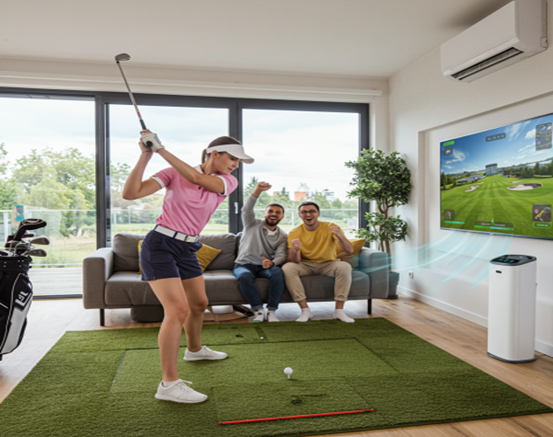Golf is as much a mental game as it is a physical one. Maintaining focus, managing stress, and staying composed under pressure are essential for success on the course. Mental toughness can be trained just like swing mechanics, and indoor golf simulators provide the perfect environment to develop these skills in a controlled and repeatable way.
The Importance of Mental Toughness in Golf
Golfers often face challenging situations such as tight lies, difficult hazards, or competitive pressure. Mental toughness allows players to stay calm, make confident decisions, and execute swings effectively. Without it, even technically skilled golfers may struggle with consistency and performance under pressure.
Using Indoor Golf Training to Build Focus
Indoor golf training simulators allow golfers to practice focus and concentration while replicating real-course scenarios. By simulating challenging holes, different weather conditions, and pressure situations, players can strengthen their mental resilience. The controlled environment removes external distractions, enabling concentrated practice on both technique and mindset.
Structuring a Mental Toughness Practice Session
To develop mental toughness using a simulator:
- Warm-Up: Stretch and perform light swings to prepare physically and mentally.
- Simulate High-Pressure Scenarios: Use the simulator to create situations like tight fairways, long putts, or difficult pin placements.
- Focus on Routine: Practice pre-shot routines and consistent swing mechanics to maintain composure.
- Monitor Performance: Review simulator feedback to track accuracy and decision-making under pressure.
- Incremental Challenges: Gradually increase the difficulty of scenarios to build resilience and confidence.
Structured sessions reinforce both mental and technical skills, improving overall performance.
Benefits of Simulator-Based Mental Training
- Safe Practice Environment: Test your focus and composure without worrying about lost balls or course conditions.
- Immediate Feedback: Metrics such as shot accuracy and consistency allow for targeted improvement.
- Confidence Development: Facing simulated challenges builds trust in your ability to perform under pressure.
- Transferable Skills: Mental toughness developed indoors carries over to real courses and competitive rounds.
Practicing mental resilience with simulators ensures golfers are prepared for any situation on the course.
Conclusion
Golf simulator practice is a powerful tool for building mental toughness. By engaging in indoor golf training, players can simulate challenging scenarios, reinforce focus, and enhance decision-making under pressure. Consistent practice strengthens both the mind and the body, enabling golfers to perform with confidence, consistency, and composure in real-world play.
bento4d toto togel toto togel slot online bento4d bento4d bento4d situs slot situs slot bento4d bento4d bento4d bento4d situs toto
